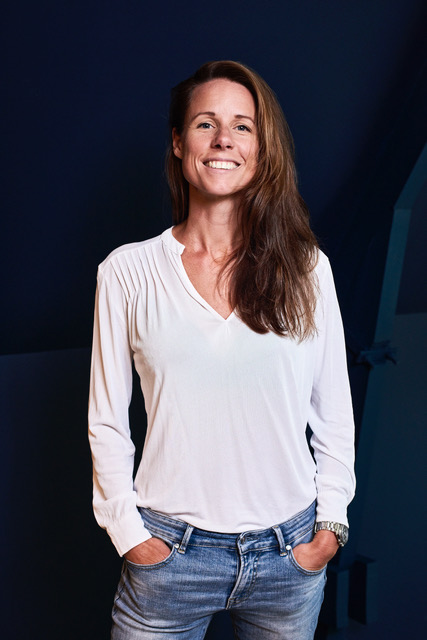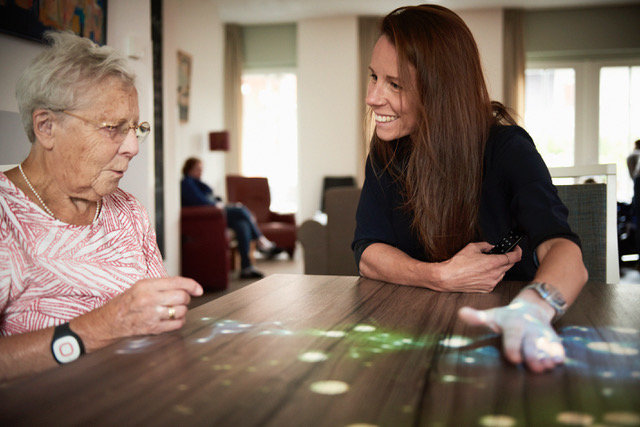Hester Anderiesen–Le Riche elected TU Delft Alumnus of the Year 2023
Hester Anderiesen-Le Riche is the founder and CEO of Tover, the company behind innovations such as the Tovertafel, or Magic Table. While doing her doctoral research at TU Delft, Le Riche designed a type of interactive game therapy that uses light projection for people with cognitive challenges such as dementia. More than 8,000 care homes across the world now use Tover games.
Hester Anderiesen-Le Riche is a classic example of how you can have an enormous positive impact on people and society using design and innovation. TU Delft is proud to have such a versatile and inventive engineer among its alumni.
Jasper Peterich, Director of Alumni Relations and the Delft University Fund

The Tovertafel and its impact
Hester Anderiesen-Le Riche studied Industrial Design Engineering at TU Delft. During her associated doctoral research, she looked at how senior citizens with dementia could be encouraged to undertake physical activities and social interaction. Her answer was the Tovertafel: interactive light projections on tables or on the ground that respond to users’ hand or arm movements. This pioneering game technology gives people who live with dementia a form of physical, cognitive and social stimulation and thus creating moments of pleasure and happiness. The Tovertafel is proven to effectively break through apathy – one the most common symptoms of dementia – and increases the quality of life of people with medium to severe dementia.
The success of the Tover games are founded on years of research. During her doctoral dissertation, Le Riche worked closely with Professor of Neuropsychology Erik Scherder at the Free University of Amsterdam and Professor of Physical Ergonomics Richard Goossens at TU Delft. Goossens says that “During her design research doctorate, Hester became serious about play. By combining her understanding of human behaviour and her observational studies of residents of old people’s homes she was able to provide scientific evidence of the positive impact of the Tovertafel.” Research is still at the heart of the company. All the games are designed using co-design methods and in close cooperation with the target group and their care environment and the people around them. Le Riche continues to work with universities and research organisations in most of the countries where she sells her products, which includes examining the effects on the care professionals. The Tovertafel appears to help reduce their workload and make their work more enjoyable.

TU Delft entrepreneurship and extending the area of work
Tover is a good example of TU Delft entrepreneurship in which Le Riche combines her roles as designer, researcher and entrepreneur. In 2011 she designed the first prototype of the Tovertafel as part of an interdisciplinary research project. In doing so she worked with game developer Monobanda and the healthcare organisation Careyn. The first Tovertafel was used in March 2015. It gave the company the accolade of ‘the most innovative start-up in the Netherlands’.
In the meantime, Tover has expanded its work to senior citizens in the early stages of dementia, adults with intellectual disabilities, and children who need extra support. And its developments continue. Customers can now personalise and enrich the Tovertafel experience for care home residents in a new online environment. Later this year Tover will launch the Tovertafel Pixie, a more intimate and mobile version of the Tovertafel.
Symposium and award ceremony Alumnus of the Year 2023
On Tuesday 6 February Hester Anderiesen-Le Riche returned to her alma mater for the festive award ceremony. To mark the Alumnus of the Year elections, a plaque was unveiled on the Alumni Walk of Fame at the Mekelpark at the TU Delft campus by Rector Magnificus and President Executive Board Prof. Tim van der Hagen.
Prior to the unveiling, the mini-symposium “Beyond Cure and Care - Symposium on Purposeful Play for better Health” took place at the Faculty of Industrial Design Engineering, where Hester graduated and obtained her PhD. The focus was on how design can be used in healthcare. Speakers included Philip Scheltens, Emeritus Professor of Neurology, founder of the Alzheimer Centre at Amsterdam University Medical Centers and Head of EQT Life Sciences Dementia Fund; Richard Goossens, professor of Physical Ergonomics at TU Delft and Hester herself. The symposium was moderated by Assistant Prof. Jos Kraal.